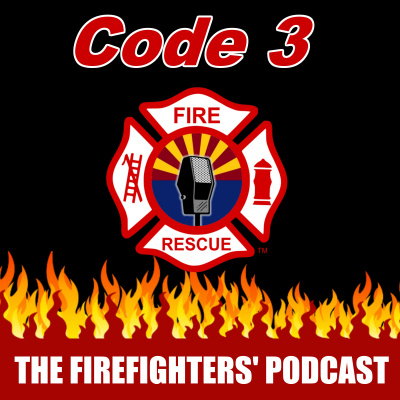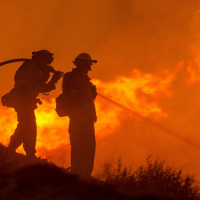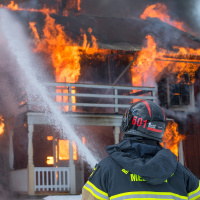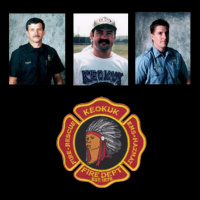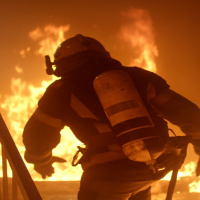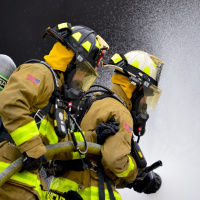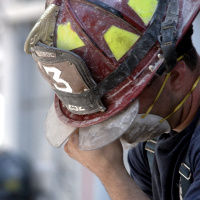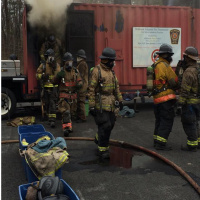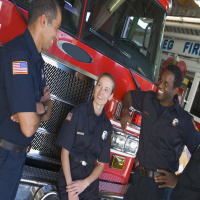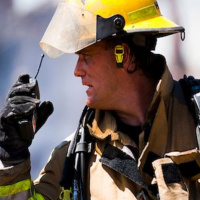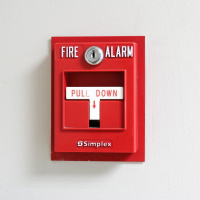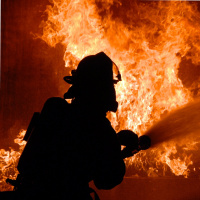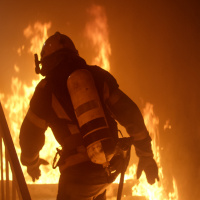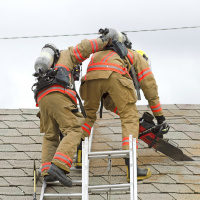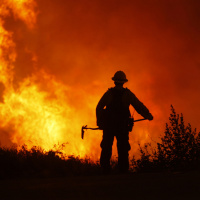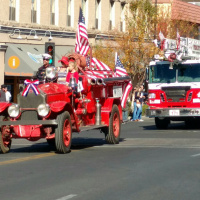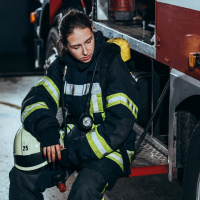Synopsis
The twice-weekly podcast for and about firefighters, "Code 3" covers topics of interest to those in the fire service, through interviews with those who know it best. From Chiefs to Probies, Engineers to Firefighters, and Paramedics to EMTs. award-winning journalist Scott Orr talks with them all.
Episodes
-
Rural Firefighting: Minutes Make a Difference with Justin Bailey
02/07/2020 Duration: 22minIf you’re a firefighter in a large metro department, you might find today’s topic a little unfamiliar. Because for firefighters in rural or even suburban areas, the challenges can be very different than yours. And if we’re talking about a volunteer department, that adds a level of difficulty. Today’s guest is the chief of a volunteer department that covers a rural community. He knows that any call may be hampered by longer response times, a lack of manpower, and even lack of water. Yet his department has the same goals as every other: to get on scene and get the fire out. How to accomplish that? The first 10 minutes on scene count. We’ll talk about that. Justin Bailey is the fire chief of the Oliver Springs Fire Department in Tennessee. He oversees 20 paid-on-call volunteers who cover a 5.5 square mile area. Justin’s also a master firefighter with the Knoxville, Tennssee Fire Department, where he has served since 2007. He hosts seminars on volunteer training program development, professional development and r
-
Don't Believe Your Own PR with Ken Himel
25/06/2020 Duration: 19minEverybody knows THAT guy. There’s one in every firehouse. He’s easy to spot. He knows and is happy to lecture you on every fire science topic, but never seems to have time to help wipe down the rig. But as Chief Brunacini reminded us, egos eat brains. That’s why it never pays to believe your own PR. My guest made captain and then figured out that he’d become THAT guy. Ken Himel has almost 30 years in the fire service. During that time, he’s served in volunteer, combination, full-time, and career departments. He’s currently chief of Bayou Cane Fire Protection District in Houma, Louisiana. He is a certified fire instructor level II
-
Water Always Wins with Curt Isakson
18/06/2020 Duration: 23minWith today’s rapid fire growth, it’s more important than ever before to get water on the fire as fast as possible. Flashovers, for example, can occur in just minutes now. But another factor these days works against us: limited staffing. Decisions about what jobs get done first need to be based on that reality. My guest today says getting water on the fire is the primary goal. Even more than search and rescue. I’m pleased to have Curt Isakson back on Code 3 today. He is currently a Battalion Chief for Escambia County Fire Rescue in Florida where he has worked for the last 19 years. Before that, he worked 9 years for Pensacola Fire Department. If you’ve missed seeing him speak at a live conference, you’ve missed a lot. He’s a lot of fun to watch and you’ll learn a thing or two. He also owns County Fire Tactics.
-
Behind These Walls May Lurk Unexpected Danger with Jack Murphy
11/06/2020 Duration: 18minHere’s some easy math for you. What percentage of your time is spent on the rig and available? Now what percent do you spend looking at the exterior of buildings in your first-due area, planning for future responses? Now—and this is the tricky one—how much time do you spend stopping by these buildings to look inside? Today’s guest says that’s critical when you’re looking at a tilt-up concrete structure. That’s because this style of construction can be deceptive. The outside doesn’t necessarily give away what the inside look like. Jack Murphy spends a lot of time thinking about this. He’s chairman of the High-Rise Fire/Life Safety Directors Association in New York City. He is a retired fire marshal, a former deputy chief, and a former Bergen County, New Jersey deputy fire coordinator. He is the author of numerous fire service articles and wrote a field handbook on the Rapid Incident Command System, as well as authored the “Pre-Incident Planning” chapter of Fire Engineering’s Handbook for Firefighter I and II.
-
Introducing "True Fire"
10/06/2020 Duration: 23minToday, I am introducing a new podcast. Don’t worry, this one’s not going anywhere.The new show is called True Fire, and it’s different from any other podcast available. It’s also quite possibly the most important one ever. Each episode breaks down, in detail, a line-of-duty-death fire. We know how these men and women died. True Fire tries to answer why. If you think it’s as important for people to hear as I do, then please go to truefirepodcast.com and click on the Kickstarter link. I have a $4,500 goal to reach by July 13. That’s what it’ll take to produce all six episodes of season one. True Fire is a monster to create, and that budget reflects this. If I make it to a second season, I may be able to bring on some help, but for now, I am doing it all…from research, to writing to interviewing, to recording, to editing.
-
How To Be Aggressive Without Being Reckless with Duane Daggers
04/06/2020 Duration: 18minI’ve noticed a lot of chatter on social media over the past months about the idea that fire departments aren’t aggressive enough anymore. The next poster will comment that we’re no longer in the stone age, and we can’t be so reckless anymore. Then someone will bring up Danny Dwyer, and things will get personal. Now, look: if my house is on fire, I want the firefighters who respond to save my wife, if she’s trapped. Period. If she’s out, save my stuff. Don’t stand outside and call it a defensive fire. Or wait for more resources. So I get that. But today’s guest says aggressive does not equal reckless. Duane Daggers is a captain with the City of Chesapeake, Virginia, Fire Department and a life member with the Gouldsboro, Pennsylvania Volunteer Fire Company. He’s been on the job for 35 years, and an instructor for over 20 years.
-
Train 'em and get out of their way with Kaci Corrigan
28/05/2020 Duration: 18minSometimes, we make things more difficult than we need to. We develop a course of training, then insist on dictating every move firefighters make once they master it. The bottom line, usually, boils down to: put the wet stuff on the red stuff and the fire goes out. More wet stuff applied faster puts the fire out faster. This is taught on, or about Day One in Firefighter-1 classes. It’s certainly not all they’ll learn, but the rest builds on that foundation. And, with experience, they will use their own judgment, which we assumed was sound when they graduated, to guide them. So why do so many officers micromanage their crews? After all, wasn’t the point of training them so they could do the job? I’ve always hated being treated that way, and, conversely, I have loved to be able to point the guy at the job and count on him to get it done. My guest today, Kaci Corrigan, advocates for that same attitude. She’s a lieutenant at a department in Northwest Pierce County, Washington. She’s been on the job for 13 years. S
-
Firefighter PTSD: A Spouse's Perspective with Lori Moore
21/05/2020 Duration: 18minLast week, we talked with Chris Moore, a captain with the Chesapeake, Virginia Fire Department about his battle with PTSD. This week, I’m bringing you the other half of the equation. That’s his wife, Lori. If you’re a firefighter and you believe you have PTSD, please play this show for your significant other. Because, try as they will, no one fights PTSD alone. It affects all their relationships, especially the one between the firefighter and their spouse. Lori has been married to Chris for 16 years and they have a son, who is now 14. She saw the factors leading to Chris’ trauma begin to mount. And she has some insights as to what a spouse must endure while dealing with their partner’s PTSD.
-
To PTSD Hell and Back with Chris Moore
14/05/2020 Duration: 19minTwenty years ago, it was a big no-no for a firefighter to admit to having anything like Post-Traumatic Stress. Of course, it’s still stigmatized in many firehouses. That’s a problem. PTSD can affect anyone, even the toughest firefighter. It doesn’t take being part of a line-of-duty-death or even a near-miss to cause it. And it can turn a dream career into a long-term nightmare. Suicides, driven by trauma, now take more firefighter lives than line-of-duty-deaths. But there are solutions. If you have PTSD and you’ll ask for help, it can be dealt with. With me today is Captain Chris Moore of the Chesapeake, Virginia Fire Department. He’s been a firefighter for 27 years. Chris has experienced the darkness of PTSD and recovered from it. Now he works to help others through his department’s Peer Support and Behavioral Health Team.
-
This Volunteer Department’s Got It Figured Out with Ed Dolan and Shawn Heppner
07/05/2020 Duration: 24minHow would you define success in a volunteer department? Would it be recruiting and retention? Or how about solid leadership? Maybe response time? Today, we’re going to talk about a department that meets all of those criteria. It’s called Ulster Hose Company 5, and it’s found in New York’s Hudson Valley near the city of Kingston. Ninety members respond from their homes. And they cover 1,500 calls a year with an average time to response of 3 minutes. If you’re struggling just to get members to show up for runs, you’ll want to pay attention. Back again on Code 3 to explain how they do it is Ed Dolan. He’s been studying Ulster Hose 5 and has some interesting insights. Ed’s a member of the Catskill Fire Department in New York for 30 years, and he’s served more than half that time as a chief officer. Shabw Heppner is Chief of Ulster Hose Company 5.
-
How to stop the job from taking over your life with Dr. Donnie Hutchinson
30/04/2020 Duration: 18minWhat are your priorities in life? Most firefighters will typically answer this question by saying, “My family, my health, and my job.” But the reality is, most firefighters I’ve known, and I’ll bet most you know, are more likely to put their job first, their family second, and their own health a distant third. For example, a study found that about 80% of career firefighters are obese. And it’s pretty well-known that firefighters are frequently workaholics, taking extra shifts and working second and even third jobs. You do it for your family, of course. But that takes your time away from them, too. There’s an obvious disconnect between what firefighters say they value and what they do. My guest today says that all adds up over time and causes a lot of avoidable problems. Dr. Donnie Hutchinson says it’s time to find a work-life balance. It’s doable, and he’s here to explain how. Donnie is a work-life balance speaker who has held many firefighter health and wellness seminars. He’s spoken at IAFF conferences. H
-
Using the radio the right way with Mark Szczepanik
23/04/2020 Duration: 13minOne of the critical skills a firefighter needs is the ability to communicate concisely and completely over the radio. Some firefighters, especially new officers, get excited on the radio and are loud, but don’t have much to say. Then the IC has to ask for clarification, which wastes time and ties up the radio. It definitely pays to take a second and be sure of what you’re going to say. The key is a balance between too much info—oh, yeah, that happens more than you’d like to admit—and too little. Here to explain how to find that balance is Mark Szczepanik. He’s a past Chief at the Lake View, New York Fire District and a dispatcher for the town of Hamburg, New York with over 30 years of experience.
-
Lines Off, Ladders Up with Ty Wheeler
16/04/2020 Duration: 19minEvery house goes on runs that the crew just knows is a false alarm. You know it, I know it, your administration knows it. But the public doesn’t. And when you pull up to that alarm you’re sure is nothing and act like it, they notice. Today’s guest says that sends the wrong message in this time when perception is reality. Especially with instant online video. But even more important, you miss a chance to develop habits and muscle memory when you act like the alarm is false. Ty Wheeler says every fire alarm can be an opportunity. He advocates an approach called Lines Off, Ladders Up.Ty is a lieutenant with the Johnston-Grimes Iowa Metropolitan Fire Department with more than 10 years’ service. He has a managing officer certificate from the National Fire Academy and is a member of the Iowa Society of Fire Service Instructors. Ty is the president of the Des Moines Area Metro chapter of F.O.O.L.S.—yeah, that spells DAMFOOLS—and co-owner of Rogue Training Consulting.
-
FDNY at Ground Zero of COVID-19 with Danny Sheridan
09/04/2020 Duration: 19minBy now, as I record this show on April 6, 2020, most of this nation’s fire departments are now dealing with the devastating effects of COVID-19. But if you think your department’s been hit hard, be glad you’re not in New York City. Just as it was on September 11, 2001, ground zero for COVID-19 is New York. The FDNY is dealing with an enormous number of deaths among citizens, so many that they no longer transport patients in cardiac arrest unless they can get a pulse in the field. The radio calls for 10-37s—dead bodies—are frequent. Constant. 12 an hour, by some accounts. Amid all this, nearly 2,000 FDNY personnel are also suspected to be infected. About 400 are confirmed. That number grows daily. Joining me to give us some perspective is FDNY Battalion Chief Danny Sheridan. He is a 34-year veteran of the FDNY, and a member of the FDNY IMT as well as a well-known instructor nationally. He’s also a lead instructor with Mutual Aid Training Group which works to train firefighters in Latin America.
-
31 Seconds from Arrival to Water on the Fire with Jonathan Hall
13/02/2020 Duration: 15minPractically every study – not to mention common sense – says the fastest way to get a fire out is to get water on the seat of the fire. Modern day fires that burn hotter and faster demand the ability to rapidly select, deploy, advance, and start flowing handlines. What’s the best way to get that speed? My guest today will be talking about The Engine Company’s Need for Speed at Firehouse World 2020. Jonathan Hall is a captain with the St. Paul, Minnesota Fire Department. He’s been in the fire service for 20 years and serves as a lead instructor in the department's Training Division. He’s the co-owner of Make the Move Training, and teaches Engine Company operations around the country.
-
TIC Tips and Tricks with Manfred Kihn
10/02/2020 Duration: 18minBy now, it seems like just about every fire department has at least one thermal imaging camera. They’ve become a valuable tool. The trick, of course, is to be able to interpret correctly what the TIC is showing you. To be able to do that, you need to train with the TIC, matching an understanding of what a TIC does with experience reading it. Today’s guest writes extensively on how to use thermal imaging equipment, as well as what it can and can’t do. Manfred Kihn is a 19-year veteran of the fire service. He’s served as a firefighter, captain, and fire chief as well as an ambulance officer. He has been a member of Bullard’s Emergency Responder team since 2005. Manfred is the company’s fire training specialist for thermal imaging technology. He is certified through the Law Enforcement Thermographers’ Association as a thermal imaging instructor and is a recipient of the Ontario Medal for Firefighters Bravery.
-
Truck Ops Whether You Have a Truck or Not with Sean Eagen
06/02/2020 Duration: 17minTruck company operations are an important part of fireground operations, even when you don’t have a dedicated truck company available. That’s why, whether you’re a truckie or not, you need a thorough knowledge of truck company operations, tools, and equipment. This show's guest will be presenting at Firehouse World 2020 in Las Vegas on the topic of Top Tips for Effective Truck Company Operations. Sean Eagen is a 20-year veteran of the fire service. He’s a captain with the Buffalo, New York, Fire Department. He is also a part-time instructor for the New York State Office of Fire Prevention and Control Special Operations Branch.
-
The Ultimate Mutual Aid: US Firefighters in Australia with Rick Young
03/02/2020 Duration: 15minThe ultimate in mutual aid has got to be the assist Australians are getting from US firefighters. These are wildland fires on a massive scale: more than 25 million acres have burned in fires that have raged since September. Thirty-one people—including seven firefighters – have been killed. Thousands of homes have been lost. Those statistics describe a fire the likes of which the US has never seen. And even though the weather has cooperated with heavy rains, it still hasn’t been enough. But about 240 US firefighters have travelled to Australia to lend a hand in the past weeks. It’s a unique experience, from the landscape to the fuels involved … to the culture shock. My guest today, by phone from Australia, is among the US firefighters currently in-country. Rick Young is in his 30th fire season for both the Forest Service and National Park Service. He’s a Type 1 Incident Commander for California Interagency Incident Management Team 5. And he’s the Deputy Interagency Fire Chief of Operations for Six Rivers Natio
-
The Only Constant is Change with Daniel Shoffner
30/01/2020 Duration: 22minThe two things firefighters hate the most are change-and the way things are now. You’ve heard that quote from Alan Brunacini before. But it’s still true and will remain true as long as there’s a fire service. Because this profession is so steeped in tradition, it’s hard to accept some of the changes that have come along. The helmet debate is just one of them- and it’s still raging. Yet, no one really argues in favor of the old-style rubber hip boots. And a lot of firefighters would like to be able to keep their turnouts grimy-it’s a badge of honor. But now, some departments don’t even put on their clean turnouts until they arrive at the scene. Here to reminisce—and talk about the positive changes we’ve seen—is Daniel Shoffner. Daniel is the PIO and strategic initiatives manager for the Burlington, North Carolina, Fire Department. With 25 years’ experience in the fire service, he’s also a volunteer with the Mt. Hope Community Fire Department in Guilford County, North Carolina. There, he follows in the footstep
-
PTSD Cost Her a Career... and Almost Her Life with Christy Warren
27/01/2020 Duration: 17minFirefighters are well aware of the pain of PTSD. They’re also often familiar with the stigma that comes with it.We’ve talked about PTSD and the stigma that comes with it on this show before. It’s maybe twice as hard to endure when the firefighter suffering from it is a woman. PTSD has been seen as a sign of weakness, and, to some degree, it still is. The judgment can even come from firefighters who are experiencing PTSD themselves. Today’s guest is a woman who left the fire service after she experienced severe PTSD. She even considered suicide as a solution. Christy Warren is a retired Captain from the Berkeley, California Fire Department. She has 25 years of service as a paramedic, with 17 years as a firefighter. She was diagnosed with PTSD in May of 2014. Now, Christy serves as a peer at the West Coast Post Trauma Retreat.
